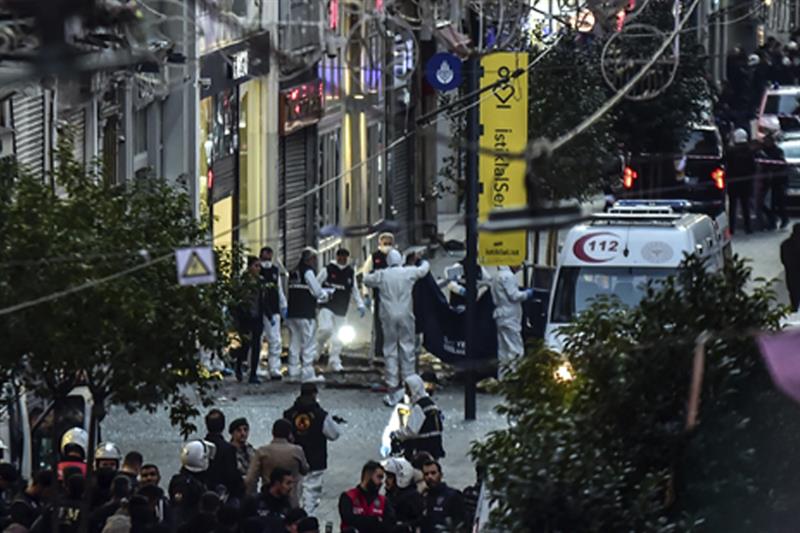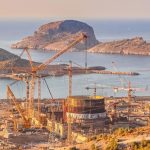The blast that hit Istanbul’s Istiklal Avenue on Sunday killing six people and injuring more than 80 was the first of its kind in Turkey in five years. On New Year’s Eve in 2017, an Islamic State (IS) group militant killed 39 Turkish nationals and tourists at the Reina nightclub in Ortaköy in Turkey.
On Monday, Suleyman Soylu, the Turkish interior minister, announced that 22 suspects had been apprehended on suspicion of being involved in the latest attack, including the perpetrator. He accused the Kurdistan Workers’ Party (PKK) of carrying out the attack.
Sunday’s explosion has revealed the problems the Turkish government now faces. It has vowed to announce the identity of the perpetrator of the Istiklal attack, but the damage resulting from it only increases the government’s woes, not least because the attack, which took place in one of Istanbul’s busiest thoroughfares, shows the deterioration of security in Turkey and may indicate that the country will be subject to more attacks in the future.
Turkey is already facing tensions as the attack occurred at a time when the country’s economic crunch is intensifying, the national currency is plummeting in value, unemployment rates are rising, and foreign debt is reaching an unprecedented high.
The political atmosphere in Turkey is also charged, as the attack took place amid political tensions between the regime and its opponents, especially in the run up to next year’s presidential elections.
Pressure is building between the government and the Peoples’ Democratic Party (HDP), evident in the regime’s refusal to release politician and author Selahattin Demirtaş, its tightening of the noose on freedoms in southeastern Turkey, and the ongoing military operations against the PKK in northern Iraq and the targeting of the Syrian Democratic Forces.
The Istiklal attack signals the rising tension between the Turkish state and the Kurdish blocs in southeastern Turkey, northern Syria, and Iraq, especially with the ongoing violence against the Kurdish currents. This explains the Turkish interior minister’s statement that the order for the Istiklal attack was issued in Kobani in northern Syria in reaction to Turkish military operations against the Syrian Kurdish People’s Defence Units in recent years.
The attack is likely to kill off any chance to settle the Kurdish crisis peacefully and to silence the guns between the Turks and Kurds, even though there have been improvements in relations over the past few months. The Turkish government had pledged to expand development operations in the southeast of Anatolia and ease tensions with the HDP. The ruling Justice and Development Party (AKP) was also attempting to attract more votes from the Kurdish side.
These efforts, however, have been in vain owing to Ankara’s procrastination and the HDP’s announcement that the Kurds wished to see the removal of Turkish President Recep Tayyip Erdogan from power and to seek local governance in line with Kurdish identity.
Anti-refugee policies in Turkey are also on the rise, with the government adopting unprecedented policies aimed at deporting refugees to areas of northern Syria. The refugee issue is putting more pressure on the Turkish regime, while the opposition is seeking to make use of it for its own purposes, especially as a result of the social, political, and economic tensions that have resulted from the open-door policy adopted by Erdogan regarding the Syrian refugees in recent years.
The Turkish government has sought in recent months to deport refugees to areas under Turkey’s control in northern Syria.
The attack also comes at a time when Turkey is seeing a strong return of nationalist ideas that exalt the nation-state and glorify the Turks at the expense of other peoples. But it shows that Turkey is no longer safe from violence and terrorism, with regime claims that it can maintain security turning out to be promotional stunts to draw attention away from other challenges.
It shows that Turkish political forces have been harmed by state policies, including the Kurdish current that has faced an unprecedented wave of exclusion that began with the arrest of its leader and the exclusion of its political representatives in parliament and ended with continued arrests among its ranks.
The blast has uncovered the modest capabilities of the Turkish security services, proving their fragility and embarrassing their leaders and leading Erdogan to issue instructions to enhance security measures.
It may give more room for the opposition to attract more votes in its favour, acting to put pressure on the AKP which for months has been cornering its opponents and belittling the influence of Erdogan’s potential opponents in the elections. This could not have been more evident than in the four-year court sentence issued against the mayor of Istanbul.
The attack may give the Turkish government the opportunity to increase its attacks on the Kurdish forces and intensify its repression against the HDP in preparation for its exclusion from political life.
The explosion, if perpetrated by the PKK as the government claims, may be the beginning of a series of terrorist operations in Turkish cities, including Istanbul. If so, these will seriously impact the forthcoming elections, and may also negatively affect the future of the AKP, whose popularity is already waning.
This is in addition to its repercussions for Turkish military engagements against the Kurdish blocs outside Turkey’s borders. It is expected that the Turkish offensive against the Kurdish forces in northern Syria and Iraq will now escalate in the coming weeks and months.
By: Karam Said
Source: Al-Ahram



